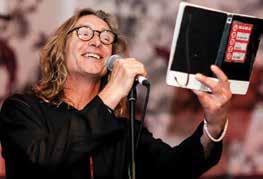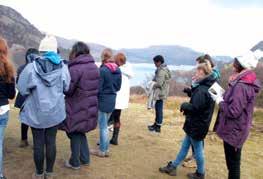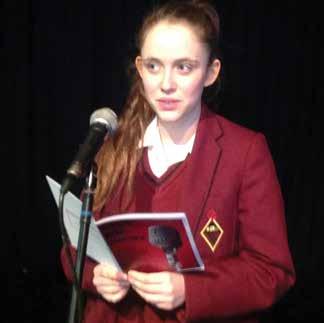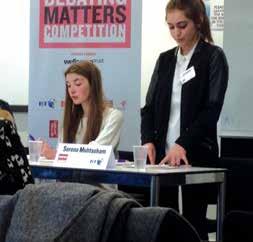
12 minute read
English & Drama
All things English...
Curriculum reform is high on the agenda as the Girls’ Division English Department finalise their plans for the new GCSE, AS and A level syllabuses. However, the time at which we busy ourselves with looking to the future of our subject is also the year in which the school celebrates its centenary. Therefore this is a more pertinent time than ever to reflect upon the influences that have been brought to bear on English today.
Like all disciplines English is largely defined by the content specified by the National Curriculum and examination boards, but the subject is harder to pin down than one might expect when conflicting ideologies and agendas pervade. Healthy debate continues to rage in schools across the country as to what approach teachers take.
So what has English meant to students over the past 100 years? The teaching of English grammar has its roots in the eighteenth century and, of course, the teaching of Latin grammar for many centuries before that, but at the beginning of the twentieth century the teaching of literature was a relatively new discipline. In the nineteenth century a steady trend for including some works of literature on the school curriculum began, but it is interesting to note that it is not until 1859 that English Literature first appeared as a degree subject at the University of London. The texts on the curriculum in the early years of the twentieth century would have been drawn from the literary canon, a collection of works that have acquired a high level of status and are regarded as great. Inevitably the work of female writers and those from other cultures and traditions would have been less well represented than those of male writers. However, as the century progressed we began to see the breadth of texts widen to include those that gave us a window onto worlds previously neglected. For much of the twentieth century the tension remained between a prescriptive approach to English grammar with a stress on ‘correct’ and formal usage, and the celebration of innovation through literature and a greater focus on creative writing. It must be the case that many of us came to detest the kind of repetitive exercises involving cats and mats that drummed in these rules. Rules which contradicted directly the ways in which language is used effectively by us in a wide variety of contexts.
As early as 1947, research began to suggest that becoming a skilled writer was not dependent upon formal grammar teaching, but change takes time and in the 1960s the O level English paper still contained much that had been in evidence in the 1920s, including: precis, punctuation of sentences, correcting of ungrammatical sentences and letter writing.
However, for all the flux and change the twentieth century has been marked by many of the core values of our subject remain the same. As teachers of English at Bolton School Girls’ Division, we aim to encourage all the girls who pass through our classroom doors and get involved in our extra-curricular activities to have a love of reading; to appreciate language variety through experience and experimentation and to acquire the skills and knowledge that will equip them for life. The following is a celebration of some of the activities and events that have taken place over the past year.
Poetry in motion
Train journey, from Cardiff to Manchester Piccadilly (and then Victoria to Atherton)
Cardiff sky, akin to rainy Manchester Always more appealing Now Fuschia with misted indigo Telephone pole after pole Relentless tick of the line, sky like Opaque tights at the bottom of my case These lights are opalescent My skin looks like chimney smoke Among the drops of the fading window A child cries, a woman coughs Piccadilly depart 18:30, stroll across noirtinted streets Still smelling Windsor Blues on my sleeve 19:12 service to Atherton is now leaving platform 6 ABBIE-NICOLE ALKER
It’s my Jam
I’m stood in the bar next to my friends But conversation’s taken a lull, And as look around, the room’s in silence Even though it’s tragically full. But then it happens, the spotlight shines On my body from toe to head, And the music changes to Bruno Mars, It’s ‘Treasure’, the jam to my bread. I rise to my feet, slowly at first While the crowd breaks apart in my path, Then I strut down the aisle as shocked gazes turn And they faint in my aftermath. My shoulders start first, they bounce as I strut Then my arms rise up past my face. My feet start to kick and my hips start to twist, They all stare, amazed at my grace. LIZZY DILLON
At Night
When only your brain is alive The shadows lift away from the walls, Swim like nervous fish Across the room And dance in the dim light. Gravity takes a rest And your hair lifts slowly From your pillow And, like waving weeds in water, Curl around your cheeks. Forgotten thoughts glisten Like dropped pennies as they try to find new homes Where you will see them. And when morning rises The night goes to sleep, the trees outside Tap you to wakefulness. HELEN MORRIS
Teaching English in the seventies (the 1970s, not the 1870s)
In the 1970s, when I started teaching English, you could tell a lot about a school’s English department from looking at their book room. If they had copies of O’Malley and Thompson’s The Art of English they were very traditional, but if they had the Penguin Voices they were progressive which meant mixed-ability and resourced-based learning, as it was called in those days. The Art of English was not a bad textbook-it had the occasional picturebut students nowadays would find it ‘dry’. Voices was a mixture of poems and artworkphotographs by Don McCullin or CartierBresson, or a reproduction of a Van Gogh or Picasso-and poems by contemporary writers such as Roger McGough, Seamus Heaney and Denise Levertov (woman poet-shock-horror).
On my PGCE course ‘grammar’ wasn’t mentioned, let alone how to teach it - grammar was something that the pupils somehow magically acquired, via a kind of linguistic osmosis. On the plus side, as a teacher, you had a lot freedom. Of course, there were exams: O Levels at the end of the Fifth Form, one for English Language and one for English Literature, but no anthologies and no coursework.
Of course, some things haven’t changed at all!
Tim Heavisides
Girls of all ages received recognition for their creativity at a special Open Mic Night where they were selected to perform their poems and stories alongside poet Mike Garry. Ruby Cummings was the overall winner for her short story, ‘Hairstyles’. Mike also delighted the audience with a rendition of his own poetry, such as ‘The Threads That Weave’ commissioned by Manchester United.
Live Writing
Poet Mandy Coe encouraged pupils from Years 8 and 9 on to the stage to write poems on the spot, on her visit in January. Asked to write about a tree without using the letter E, the work they produced was original and surprising. The interactive and inspirational session was enjoyed by all.

Lake District
Retracing the steps of William and Dorothy Wordsworth, girls from Years 9 to 13 attended a Writing Retreat in the Lakes, visiting Dove Cottage where the family lived 200 years ago. Under the expert tuition of professional writers, they produced stories and poems inspired by the breath-taking surroundings.

Hairstyles
I used to judge people solely on their hairstyle. All my friends had long, blonde hair that was shiny and never greasy. There was a girl in my English class - her hair was lipstick red and candy floss pink. Weirdo, I thought. Weeks passed and I stayed away from her, her colours made my eyes ache. Soon after this I got sick and my hair started to fall out, little by little and then what seemed like all at once. My friends pretended it didn’t matter, but I saw how none of them could look at my bare scalp without grimacing... It made me angry that they cared so much about it; but it made me furious that I did too. I couldn’t sit there every lunchtime and stare in envy at their “gorgeous” hair; so I went and sat alone. A day or two later the fiery-haired girl ambled over to my table and asked me why I’d shaved off my hair, she said it looked “totally cool”. I smiled and we chatted about things I didn’t know people talked about over school lunch. Capital punishment, euthanasia, equality and how the Simpsons has gone downhill. Over the next couple of weeks I began to look for Felicity, the girl with the wacky hair at lunchtime, and whoever got to the dinner hall first would save the other a seat. And now, two months later some of my hair has grown back, but I’ve kept it short. And dyed it green. People see me and notice my short, ocean green hair and I notice that some of them have a certain, discerning look - but that doesn’t bother me.

Three girls from Year 8 enjoyed a weekend of discussion and debating at the MUN-HIGH 2015 event which was held at Manchester High School for Girls. Amelia Doherty received a special mention for a particularly confident contribution during one of the sessions.
The Girls’ Division hosted the second round of the ESU Schools’ MACE competition in February. Six schools attended the event and fierce debating ensured. This is the oldest debating competition in the country; it offers participants the chance to challenge themselves with debates on controversial topics and international affairs.
Four girls from Bolton School Girls’ Division took part in the Qualifying Round of the Debating Matters competition. Lively and impressive arguments took place based on the two motions: ‘Artistic expression should never be censored’ and ‘The UK must embrace the use of fracking’. The Girls’ Division were victorious and, in the words of the judges, ‘sailed through’ to the Regional Finals.
The second round of the Debating Matters competition took place in April at The University of Manchester. Six keen debaters from Girls’ division took part. Isabella received an honourable mention in the presentations at the end of the day for her performance and contributions from the audience.
This year has been extremely productive for the Senior Literary and Debating Society. A large amount of time has been dedicated to Parliamentary-style debating. A group of students also went to the Royal Exchange Theatre to see Shami Chakrabarti speak about the future of Human Rights, LGBT initiatives, and government surveillance.
We crouched by a wall; The advanced guard, Waiting. Bullets
Of dread leaden in our guts, Grime our first layer of skin. Sweat cooled, slipped On bayonets. The smell I won’t forget. Charred carcasses sick-sweet, Leeched, Out of summer’s heat.
We could hear shells Before they hit. A keening whistle, a flinch The silence. An explosion so loud we couldn’t hear it. Then the “Hail Mary’s” Mumbled by Percy, Rodger and George; Prayers ringing the quiet. But not Freddy. Freddy didn’t believe in that, He said. Though what he believed in I could not say. Weeks of iron dread Must have unhinged him. Unhooked his mind from the cold light of day. We squatted in the dust, ducked overhead shells As we bit our lips and bloodied our skulls, Slipping and sliding In sweat, to keep quiet to see the Boche to take aim and fire When the dust cleared.
And when the dust cleared…
We were up, shaking Fumbling the trigger, Freddy leapt over the wall And the ground began to quiver We knew what that meant Our shoulders tensed We ducked to the ground But I half-sensed…
I looked up, Defying command There was Freddy, Throwing down arms. He took a step A leap Toward the humming shell He threw himself u-
I did not hear the yell. I heard the silence. The explosion so loud you can’t hear it. But I could see it. Fire, incendiary white Shattering upwards Thrusting aside, Ricochet outwards In a halo of light, Two strong lines Spreading in flight… …and Freddy, little lost Freddy. Just turned sixteen. His slim figure fragmenting, Obliterated by beams Of white-hot shell. They splayed apart like wings. Where they caressed, they burned and Blazed at my face, Threw us all backwards; We landed in a daze.
Charred carcass. Sick-sweet. Surged up on the breeze. Percy was mumbling about angels, Rodger was enraptured, George was shaking, Said we’d all be captured. But no. They’d stopped. Maybe their shells depleted. Giving us time, The time we needed


Natalie Henderson’s poem, The Legend of Mons, won this year’s BSGD National Poetry Day competition.
Legend of Mons
Women in the Theatre
For many years women were banned from the stage. Tolerated more than accepted - lauded for their theatrical talents maybe, but still looked down upon as essentially immoral and of low character. Because of this, many early actresses adopted the appellation of ‘Mrs’ whether they were married or not, simply because the married title implied a greater air of respectability. Gradually, through the efforts of many of the early proponents of their art the situation changed. The idea of theatre without women to play female roles became inconceivable. Accomplished actresses, once unknown, then finding fame only through their off-stage exploits, eventually entered an age where they could be recognised for what they were; where they could make their mark through their acting talents alone and no longer be forced to trade upon their beauty, charm and the influence of their married lovers. Although some actresses still preferred to use the married title it was no longer necessary, an actress could use the unmarried appellation ‘Miss’, as in ‘Miss Lily Elsie’, and it still conveyed chaste respectability. The day of the actress had come of age, their finest hour had arrived. Who would have thought 100 years ago that British actress Maxine Peake would play the title role of Hamlet at the Royal Exchange Theatre, Manchester? Bradshaw in his review of Peake’s performance for the Guardian remarked “It’s a terrifically fast, fluent, attacking production and Peake’s Hamlet is like a pageboy gone bad… Her casting isn’t a gimmick. Peake looks like a stowaway, or a French resistance fighter in disguise: her femaleness gives a new edge of differentness and alienation and anger”.










